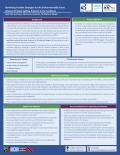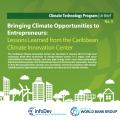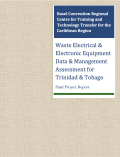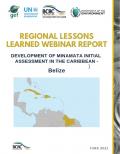
The Minamata Convention on Mercury is the first global agreement specifically designed to address contamination from a heavy metal. Under the convention, countries are charged with protecting human health and the environment from the risks of mercury exposure by systematically controlling mercury emissions and releases, including phasing out the use of mercury in certain products and processes.
This brochure highlights major findings from Caribbean countries' Mercury Initial Assessment (MIA). Primary activities of the MIA projects include a review of institutional and capacity needs for implementation of the convention, an assessment of national regulations, policies and legislation to assist with preparations for compliance with the obligations of the convention, and an identification of the primary sources of mercury emissions and releases as part of a detailed National Mercury Profile.
The MIAs were conducted with financial assistance from the Global Environment Facility and was implemented in collaboration with UN Environment and the Basel Convention Regional Center for the Caribbean, based in Trinidad and Tobago.




